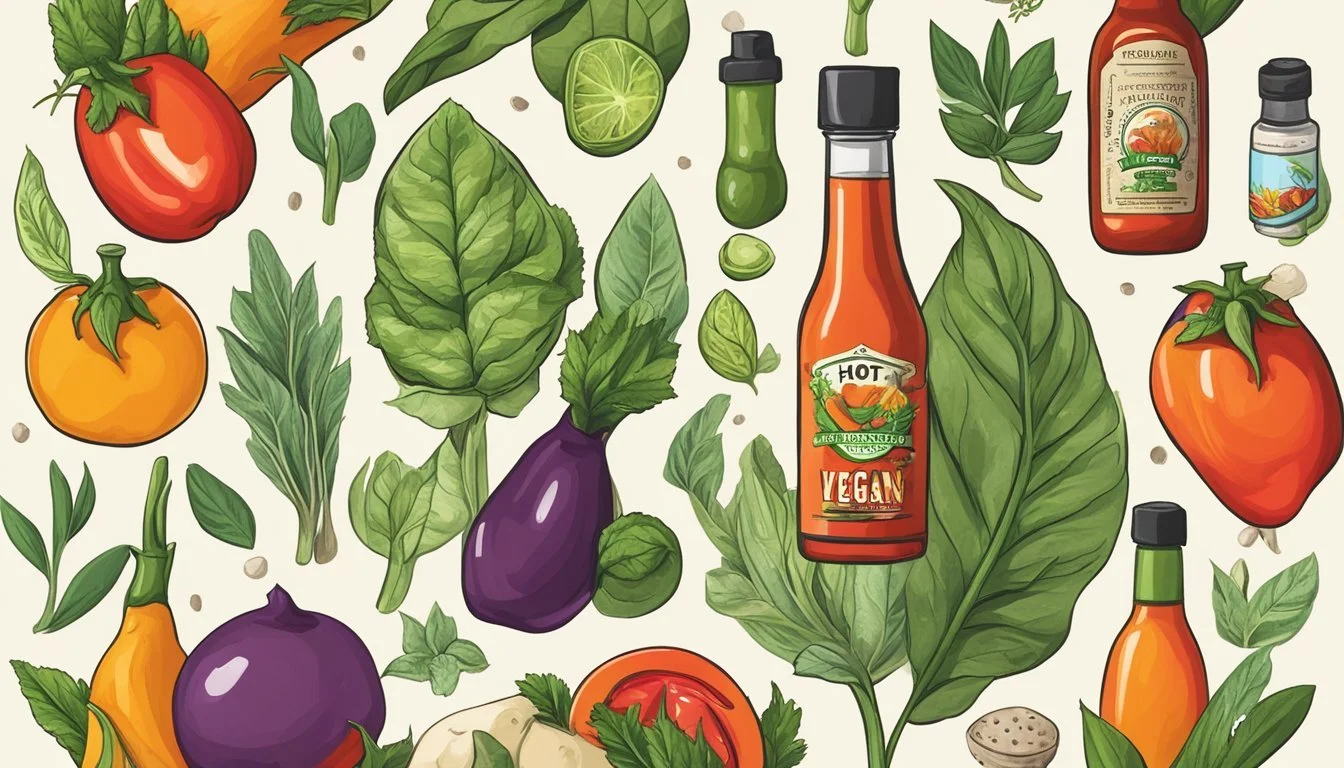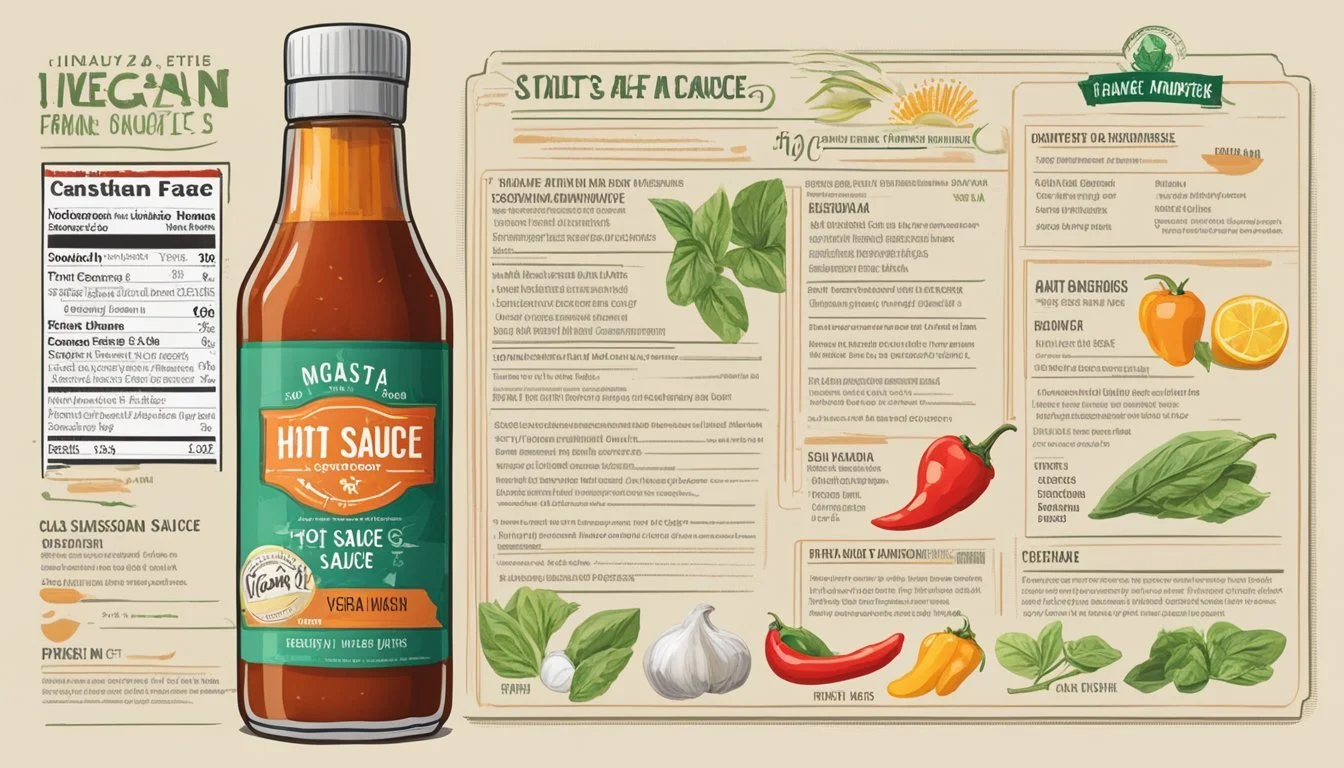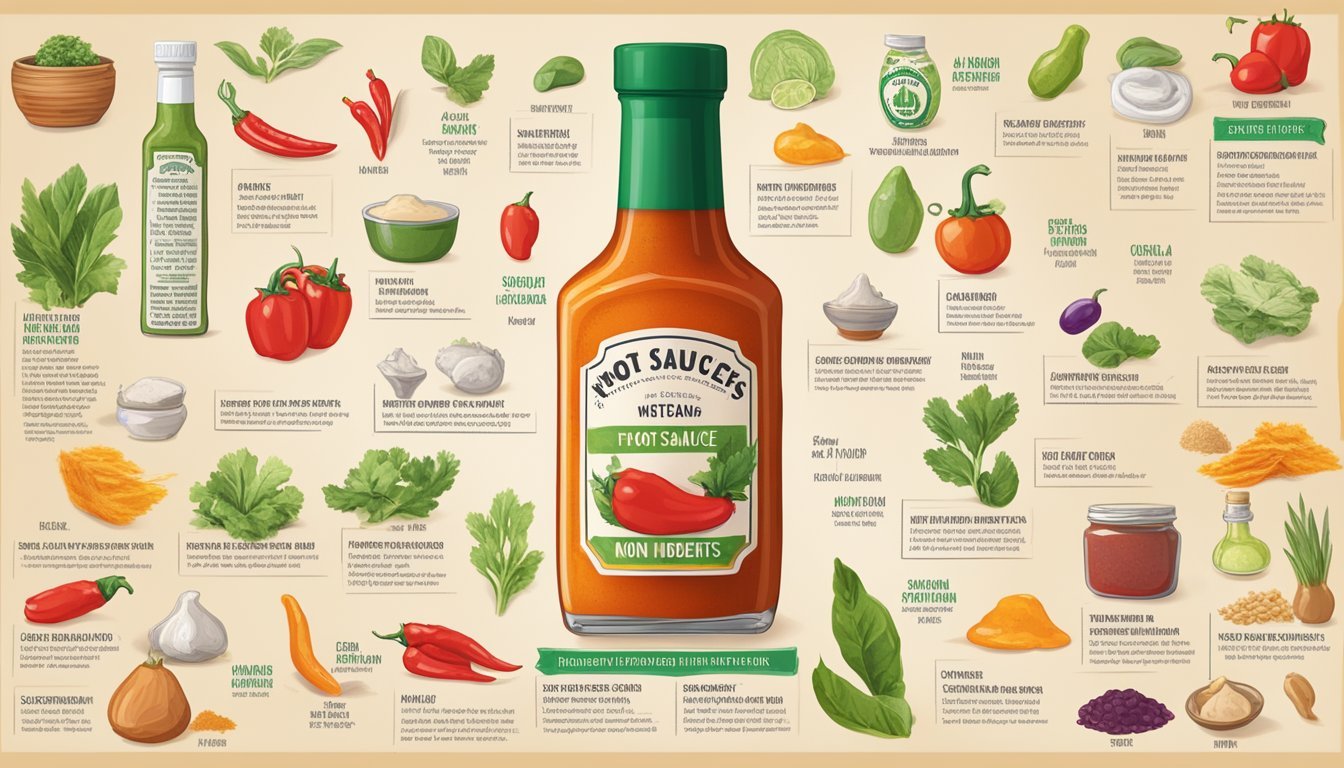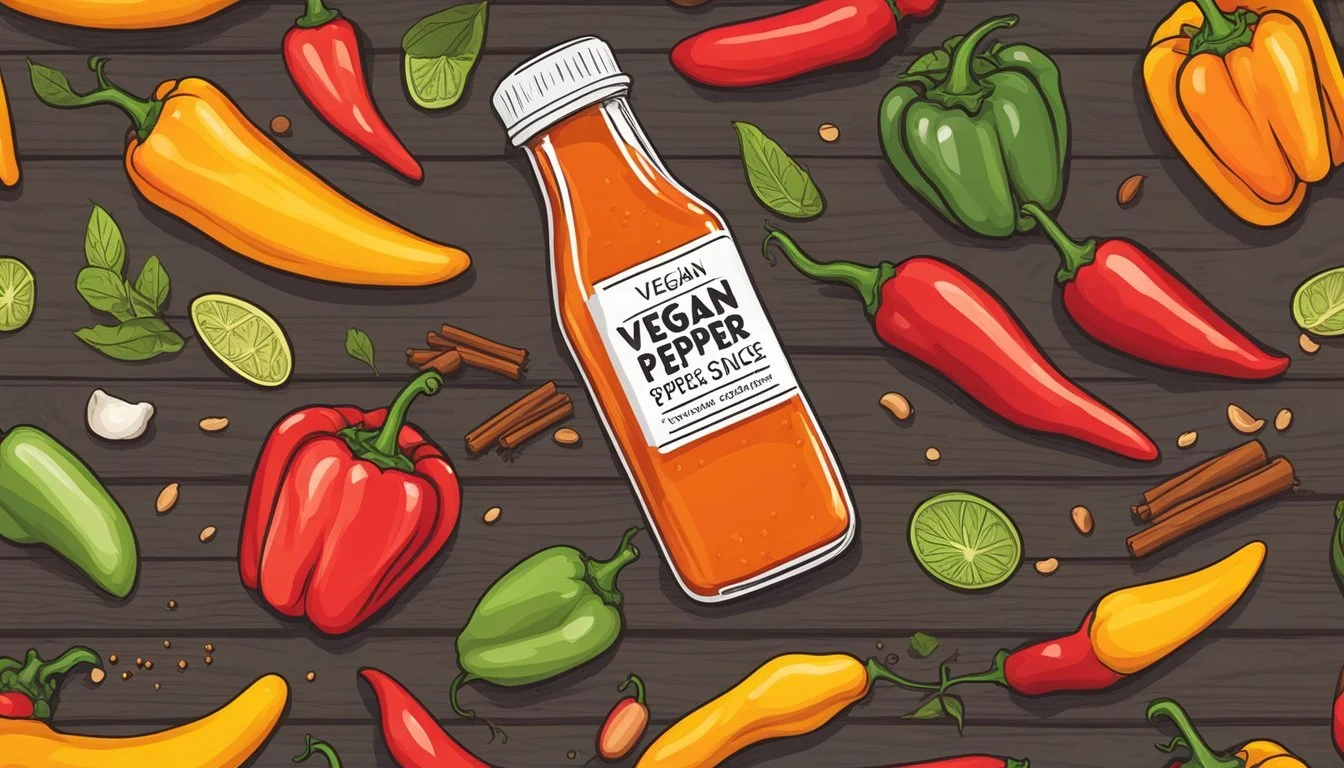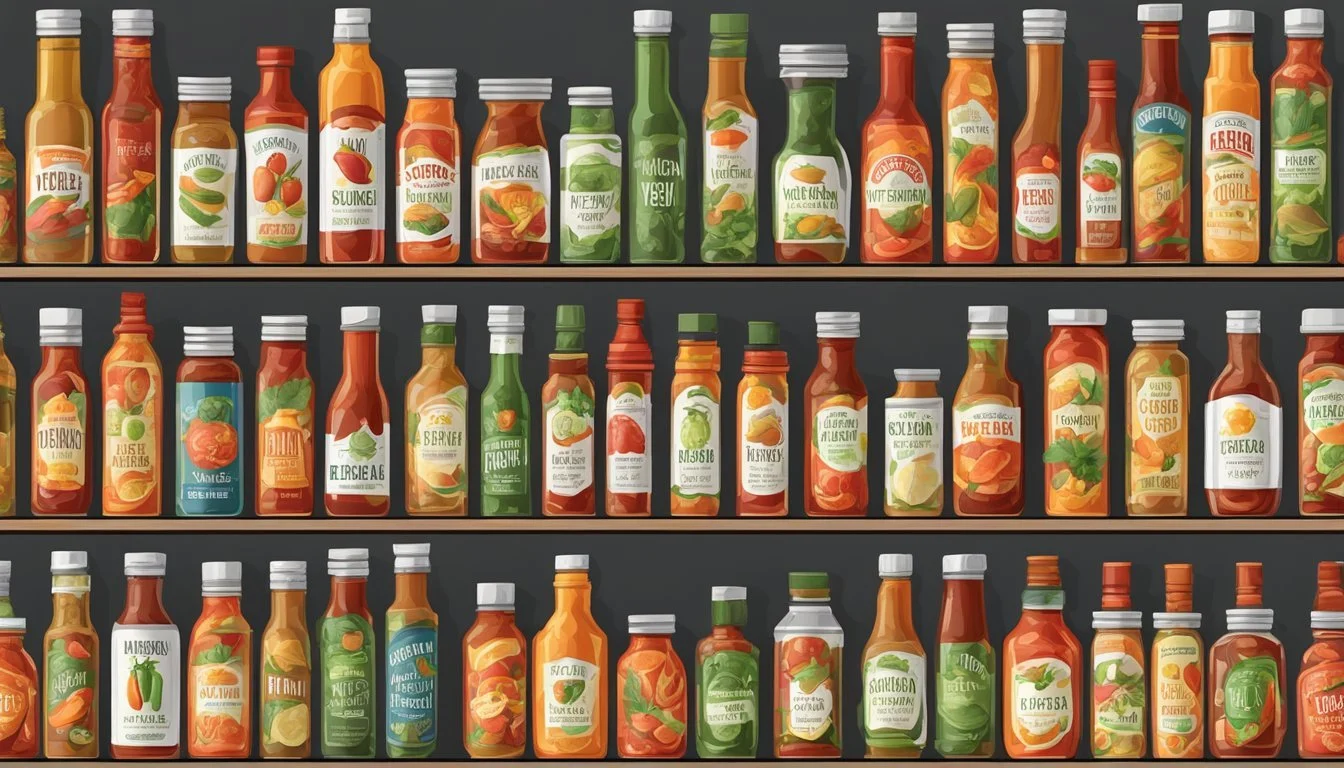Is Hot Sauce Vegan?
Uncovering the Truth About Your Favorite Spicy Condiments
Hot sauce often adds that perfect kick to a variety of dishes, but for those following a vegan lifestyle, the question arises: Is hot sauce vegan? Generally, hot sauces are made from a blend of chili peppers, vinegar and spices, which are plant-based ingredients. This makes many hot sauces suitable for vegans. However, it's important to consider that not all hot sauces are created equal.
While a large number of hot sauces on the market are vegan, some may include non-vegan ingredients such as honey, which is used as a natural sweetener, or dairy products that add a creamy texture. Vegans must scrutinize the labels and be aware of these potential additions. It's worth noting that there are numerous brands that specifically market vegan-friendly hot sauce, ensuring that consumers can enjoy the heat without compromising their ethical dietary choices.
Innovations in the hot sauce industry have also led to an exciting variety of flavors that adhere to vegan standards. Whether it is a blend featuring the luxuriant notes of truffle or the intense heat from some of the world's spiciest peppers like the Carolina Reaper, Scorpion, and Ghost Pepper, there is no shortage of vegan options. This allows vegan individuals to explore a broad spectrum of spicy condiments without concern.
Defining Veganism
Veganism is a lifestyle and dietary choice that excludes the consumption and use of animal products and by-products. Individuals who adopt this lifestyle do so for various reasons, including health concerns, ethical considerations regarding animal rights, and environmental sustainability.
Key Characteristics of Veganism:
Excludes all animal products such as meat, fish, dairy, eggs, and honey.
Often extends beyond diet to avoid animal-derived materials, products tested on animals, and establishments that exploit animals.
Dietary Aspect of Veganism:
Emphasizes plant-based foods like vegetables, fruits, grains, nuts, and seeds.
Dairy-free alternatives are used, like almond milk or coconut yogurt, to replace traditional dairy products.
A common misconception is that veganism is the same as a vegetarian or plant-based diet. However, it is more encompassing, strictly avoiding animal cruelty and exploitation in all forms. It is also important to note that not all plant-based products are vegan – some may contain animal-derived ingredients.
When analyzing whether a product like hot sauce is vegan, one must scrutinize the ingredients list for non-vegan components such as:
Honey (bee-derived)
Certain thickeners that may have dairy origins (e.g., casein)
A vegan diet is diverse and can be nutritionally complete with careful planning. It often requires individuals to be proactive in seeking information and alternatives to ensure their choices align with vegan principles.
Ingredients in Hot Sauce
The composition of hot sauce is often straightforward, but it varies by brand and recipe, with some ingredients being common and others sparking debate among vegans.
Base Components
The foundation of hot sauce typically involves a blend of chili peppers and vinegar, which gives it its characteristic heat and tang. Salt is also a staple for flavor, while garlic and other spices may be added to enhance the taste profile. The selection of chili peppers can range from mild varieties like jalapeños to fiery habaneros.
Common Additives
Manufacturers may include sugar and oil to improve the texture and depth of flavor. Onion is another ancillary ingredient frequently found in hot sauce recipes, contributing to a more rounded flavor. Preservatives, such as benzoates, and stabilizers like xanthan gum, can be present to extend shelf life and maintain an even consistency.
Controversial Ingredients
Ingredients stirring debate typically encompass animal-derived products and some non-plant derivatives. While not common, some sauces include honey or dairy elements, which are not vegan. Worcestershire sauce, sometimes used for its complex flavor, often contains anchovies. Vegan consumers must scrutinize labels to avoid these non-vegan additives.
Common Non-Vegan Ingredients
While hot sauce is often made with plant-based ingredients, it's not uncommon for certain animal-derived components to find their way into the mix. Consumers should be aware of specific non-vegan ingredients that can alter the suitability of hot sauce for a vegan diet.
Animal Products
Dairy: Dairy products such as butter, cream, and milk may be added to hot sauces to create a richer, smoother texture.
Butter: Often used to mellow out the heat.
Cream: Contributes to a creamy consistency.
Milk: Sometimes used for balancing spice.
Animal-derived Condiments:
Honey: A sweetener that comes from bees.
Fish sauce: A seasoning made from fermented fish.
Oyster sauce: Derived from oysters (What wine goes well with oysters?) and adds depth of flavor.
Worcestershire sauce: Frequently contains anchovies.
Sneaky Additives
Gelatin: A gelling agent derived from animal collagen.
Used for thickening hot sauce.
Casein: A milk protein that might be used for enhancing texture or flavor.
Can be found in some hot sauces labeled as spicy or flavored varieties.
Consumers should thoroughly check ingredient labels when selecting a hot sauce to ensure it fits within their dietary preferences.
Vegan-Friendly Hot Sauce Alternatives
In the search for vegan-friendly hot sauces, consumers will find a variety of brands specializing in plant-based ingredients as well as recipes for crafting their own homemade concoctions.
Brands and Labels
Several reputable brands have carved out a place in the market with their vegan hot sauce offerings. Frank's RedHot Original Cayenne Pepper Sauce, widely celebrated for its versatility, is vegan-friendly. Similarly, Sriracha is known for its iconic garlic-chili flavor and is also suitable for vegans. Yellowbird is a popular choice that is not only vegan but also focuses on clean, organic ingredients.
For those who prefer gourmet options, Truff, which uses truffle-infused sauces, and Los Calientes from the famous YouTube series Hot Ones have vegan options in their lineup. Cholula offers a delightfully smooth taste that complements a variety of dishes while adhering to vegan standards.
In addition to these, Torchbearer and Pain Is Good's Harissa Hot Sauce are excellent choices for someone looking for a bold flavor without animal products. When selecting a vegan hot sauce, it's important to check the labels for certifications and ingredients to ensure they meet vegan standards.
Vegan Hot Sauce Brands:
Frank's RedHot
Sriracha
Yellowbird
Truff (selected sauces)
Los Calientes (Hot Ones)
Cholula
Torchbearer
Pain Is Good (Harissa)
Homemade Solutions
Creating vegan hot sauce at home is an accessible option for those who enjoy the DIY approach. Utilizing apple cider vinegar as a base provides an excellent acidic balance to the heat. Ingredients like fresh chili peppers, vegan butter for richness, or vegan cheese for a creamy twist can be blended to craft personalized flavors.
A simple recipe could start with blending your choice of peppers with a splash of apple cider vinegar, a touch of salt, and optional sweeteners like agave syrup or dates. For more complexity, incorporate flavors like garlic, smoked paprika, or onion powder. Homemade sauces not only guarantee the absence of animal derivatives but also allow for complete control over the spiciness and flavor profile.
Homemade Vegan Hot Sauce Recipe:
Chili peppers (to taste)
Apple cider vinegar (1/4 cup)
Salt (1 tsp)
Optional sweeteners (agave syrup, dates)
Garlic/onion powder/smoked paprika (for added flavor depth)
Hot Sauce in Vegan Cooking
Integrating hot sauce into vegan cuisine offers a simple way to elevate the flavor profile of plant-based dishes, from creamy sauces to spicy toppings for burgers and salads. It serves as an essential condiment that infuses meals with heat and complexity.
Recipe Ideas
Hot sauce finds its way into an array of vegan recipes. Buffalo cauliflower wings embrace the tangy heat of cayenne pepper sauces, while hot sauce can add zest to a tofu scramble, mimicking the peppery taste often associated with traditional scrambled eggs. Vegan chicken dishes or veggie burgers gain an extra kick with a drizzle of hot sauce, whether blended within the recipe or used as a topping. For those aiming to create a spicy food experience, incorporating hot sauces into dressings for salads can offer a flavorful twist. For a bold snack, mixing hot sauce with mashed avocado elevates a simple guacamole to new levels of flavor intensity.
Buffalo Cauliflower Wings: Use a cayenne pepper-based hot sauce for a traditional buffalo flavor.
Tofu Scramble: A dash of chile or jalapeño hot sauce can add heat to your morning scramble.
Vegan Chicken: Spice up your plant-based protein with a generous helping of your preferred vegan hot sauce brand.
Veggie Burger: Top with a spicy, smoky chipotle sauce for added depth.
Salad Dressing: Whisk together hot sauce, olive oil, and vinegar for a lively salad dressing.
Guacamole: Stir in a few drops of hot sauce to give your avocado dip a fiery kick.
Substituting Non-Vegan Ingredients
Vegan cooking often requires creativity when replacing non-vegan ingredients. Creamy cheesy flavors or textures can be replicated by using cashew base sauces, seasoned with hot sauce to enhance their appeal. Alternatively, non-dairy yogurts can be turned into spicy condiments with the addition of hot sauce, perfect for topping vegan tacos or adding to sandwiches. In creamy dishes like a vegan mac and cheese, a dash of hot sauce can provide a nuanced heat that contrasts the richness of the sauce.
Cheesy Sauces: Blend cashews with hot sauce for a spicy nacho cheese alternative.
Creamy Dips: Mix non-dairy yogurt with hot sauce for a kick.
Mac and Cheese: Stir hot sauce into your favorite vegan cheese sauce for an extra dimension of flavor.
When selecting hot sauce for vegan cooking, it's essential to check the ingredients for additives that may not align with vegan standards. However, most hot sauces are inherently vegan, made primarily from peppers, vinegar, and spices.
Health Considerations of Hot Sauce
When considering the health aspects of hot sauce, one should take into account its caloric content and potential allergens or sensitivities. Ingredients such as preservatives, sodium, and capsaicin play significant roles in these areas.
Caloric Content
Hot sauce typically contains a low number of calories, making it a favorable condiment choice for those monitoring their caloric intake. However, certain varieties may include ingredients like oils or sugars, which can increase the calorie count. Oil-free and sugar-free options are available for those seeking minimal caloric addition to their meals.
Ingredient Potential Impact on Caloric Content Oils Can increase total calories Sugars Adds calories; look for sugar-free options Cream or Milk Increases calorie content
Allergies and Sensitivities
Individuals with gluten sensitivities should look for gluten-free labels to avoid adverse reactions. Moreover, some hot sauces may contain preservatives that can cause sensitivities in certain individuals. The presence of capsaicin, the compound responsible for the spicy heat in peppers, can also be a concern for those with digestive sensitivities or conditions such as acid reflux. Monitoring sodium levels in hot sauce is crucial for those on a sodium-restricted diet, as it can be high in some brands.
Sensitivity Consideration in Hot Sauce Gluten Choose gluten-free options Preservatives Check for natural preservatives or preservative-free labels Capsaicin Be mindful of capsaicin content for digestive sensitivities Sodium Opt for low-sodium varieties for reduced intake
Storage and Preservation
The longevity and quality of hot sauce are significantly impacted by storage conditions. It is essential to adhere to the optimal storage practices to maintain its flavor and prevent spoilage.
Shelf Life
Hot sauces, thanks to their acidic pH levels, largely have a considerable shelf life even when opened. However, they can degrade over time, especially when not stored properly. An unopened bottle of hot sauce can last for up to 3 years when stored in the right conditions. Once opened, the shelf life can vary but generally remains good for about 6 months to a year. Refrigeration can extend this period, although many hot sauces remain stable even when kept at room temperature.
Best Practices
To ensure hot sauce retains its flavor and quality:
Store in a cool, dry place: ideal conditions would be between 55°F (13°C) and 70°F (21°C).
Avoid direct sunlight: exposure can alter the taste and color of the sauce.
Keep the cap tight: this minimizes the exposure to air, which can introduce contaminants.
Even though hot sauces have a natural preservation system due to their ingredients, some manufacturers recommend keeping them in the refrigerator after opening to help preserve quality. However, taking refuge in the freezer is not advisable, as it can disrupt the sauce's consistency and flavor profile.
Culinary Trends and Innovations
Within the vast spectrum of hot sauces, a noticeable trend is the rise of unique flavors catering to the vegan market. This evolution is not only a response to consumer demand but also a reflection of culinary creativity.
Emerging Hot Sauce Flavors
The trend for hot sauces that blend heat with a symphony of flavors continues to grow. Consumers are exploring beyond traditional spicy profiles to experience sauces that introduce a tangy twist with lemon juice or pineapple, or those that offer a savory depth with ingredients like smoked paprika and cumin. A surge in popularity is seen with peppers like habanero, known for their fruity yet intense heat, jalapeño for a milder kick, and serrano for a more sharp spice. For those with a high tolerance, ghost pepper and cayenne are often sought after.
Innovators in the field, such as The Spicy Shark in Texas, are experimenting with unconventional pairings. Expect to encounter hot sauces infused with maple syrup for a touch of sweetness or cilantro for a fresh herbal note. Additionally, vegan pesto and kimchi-based hot sauces have started to make appearances, connecting traditional elements to the heat-centric world of condiments.
Vegan Market Trends
The hot sauce market is adapting to the vegan lifestyle by ensuring that every ingredient is plant-based. The spotlight is on vegan ranch, where the creamy texture traditionally achieved with dairy is now being replicated with vegan alternatives. Additionally, hot sauces typically involving honey are now using plant-based sweeteners, thus broadening their appeal to vegan consumers.
The table below outlines popular ingredients in vegan hot sauces and their characteristics.
Ingredient Characteristic Maple Syrup Sweet Lemon Juice Tangy Cumin Earthy Paprika Smokey Cilantro Fresh, Herbal Cayenne Spicy Habanero Fruity, Intensely Hot Jalapeño Mildly Spicy Serrano Sharp, Crisp Heat Ghost Pepper Extremely Spicy
Marketers and producers continuously gauge the preference for spiciness and flavor complexity among vegan consumers. With the vegan food market's embrace of sustainable and local sourcing as well as innovative methods like fermentation, vegan hot sauces also reflect these broader culinary trends.
Environmental and Ethical Considerations
When examining vegan hot sauces from environmental and ethical perspectives, key areas such as sustainable farming, ethical sourcing, environmental impact, and animal welfare come into focus.
Sustainable farming techniques aim to minimize environmental degradation. Vegan hot sauces that use ingredients from farms that practice crop rotation, organic farming, or reduced pesticide use contribute positively to environmental health. This approach supports biodiversity and soil health, yielding a product that aligns with eco-conscious consumers' values.
Ethical sourcing concerns the fairness of the ingredient procurement process. Companies sourcing peppers and other ingredients for their vegan hot sauces should ensure that workers are treated fairly and that sourcing does not exploit labor or local communities.
The environmental impact of hot sauce production involves the evaluation of the carbon footprint from farm to table. Manufacturers who prioritize eco-friendly packaging and efficient transportation methods reduce the overall carbon footprint of their vegan hot sauce, making it a more sustainable choice for consumers.
Finally, animal welfare is central to vegan products. Ethically produced vegan hot sauces avoid ingredients that compromise animal welfare, such as honey or dairy derivatives. Manufacturers may also avoid ingredients like palm oil, which, although vegan, are linked to deforestation and habitat destruction, affecting wildlife.
In advocating for these considerations, manufacturers and consumers collectively promote responsible consumption and bolster the benefits that a vegan lifestyle aims to achieve.

